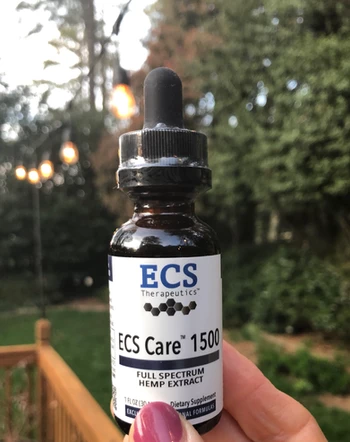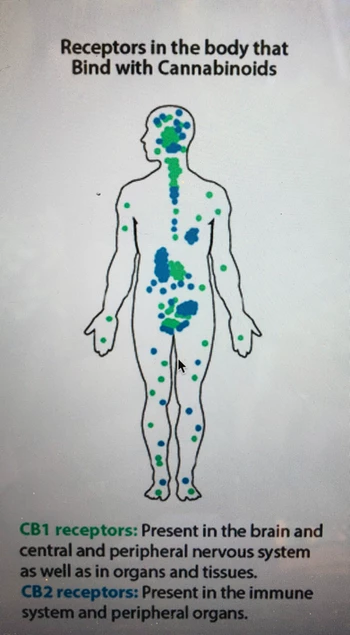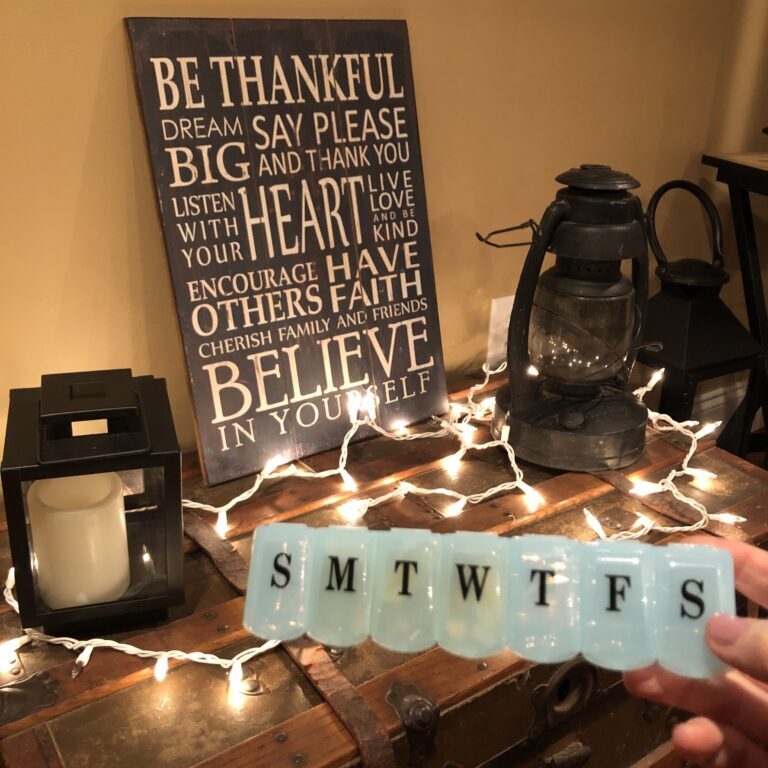Everyone is Taking CBD, Should You Take It Too?
April 29, 2019 | 14 min read

How Do You Know if You Should be Taking CBD Products?
I finally decided to write this post because I hear so many confusing statements, both positive and negative, about CBD (cannabidiol), and I have so many patients asking me about it, so I wanted to clear up misconceptions and beliefs about CBD. CBD is mainstream now, everywhere you go, people are talking about CBD and how it has helped them. What does that mean for you, should you be taking CBD, is it good or bad, does it hurt or help, and does it really have all of the benefits you keep hearing about? Additional questions you may be weeding through are the legality of CBD, and most importantly, if you decide to try it, how do you know what to buy and where to buy it?
When I first started learning about CBD I was highly skeptical, but I did my due diligence over the last two years and researched facts from fiction. I admit, I went from being totally skeptical about CBD, then became intrigued, and now, I am a big believer in the benefits of CBD and how it effects the endocannabinoid system. For the purposes of this article, I am going to focus mostly on CBD oil and the internal use of CBD, but keep in mind, CBD can be found in consumables, like edibles, gummies, coffees, but it also found in topical creams.
Is CBD Marijuana?
No. While many people are much more open minded to the benefits, especially medicinal benefits of marijuana, other people will not even read this article because they automatically hear “hemp, cannabis, CBD” and their mind goes straight to marijuana and they close their minds to the very benefits of CBD.
Is CBD Safe?
If it is used properly, the source is pure, high quality, purchased from a reputable distributor, then the answer is most likely yes, however, there may be complications with specific medications if you have genetic issues with clearing certain medications from your system. Be sure to always consult with your own medical providers for medical advice.
What is the Endocannabinoid System?
This is a well known system inside our body, and it keeps our body in balance, or in homeostasis. It has always been there but it was not discovered until 50 years ago. Just like we have a cardiovascular system, a pulmonary system, and a nervous system, for example, we also have an endocannabinoid system. This system is always on surveillance, looking for signs of trouble and if it spots issues, it releases chemical messengers which then release neurotransmitters in response to whatever area needs help. I say this all the time, but our bodies were meant to heal, to be in balance, and this is more evidence of how phenomenal the human body is at healing.
Are CBD and THC the same thing?
Dr Raphael Mechoulam, pioneer researcher and professor from Medicinal Chemistry at Hebrew University, successfully separated CBD and THC, with THC being the psychoactive component found in marijuana. Remember, THC and CBD are very different from each other.
What are Endocannabinoids and Cannabinoids?
Our body produces cannabinoids, natural chemicals called ENDOcannabinoids that attach to receptor sites called CB-1 and CB-2. The names of the two endocannabinoids, which are made by our bodies, are anandamide and 2-arachidonylglycerol, (which is more easily referenced as 2-AG). They attach to CB-1 and CB-2 receptors like lock and key, thus providing balance.
But here is where it gets even more interesting, CBD provides phtyocannabinoids, which means plant cannabinoids, and they can also attach to CB-1 and CB-2 receptors.
So endocannabinoids are made by our body and phytocannabinoids come from plants, and they both have the ability to attach to the CB-1 and CB-2 Receptors.
Where are the CB1 and CB2 receptors located?
These CB1 and CB2 receptors are broadly distributed all over the body, and that is exactly why you hear so many benefits being claimed about CBD because it can attach to so many different systems and areas. When I first heard of the numerous benefits of CBD, that is exactly what made me so skeptical, because it all sounded too good to be true. However, once you understand how many of these receptors we have, and where they are located, it all begins to make sense.
CB1 receptors are in the brain and nervous system, they play a role with mood, pain and sleep.
CB2 receptors are found in the immune system, including the spleen, bones, skin and gastrointestinal system.
Does CBD come from marijuana plants or hemp plants?
This is probably one of the most confusing questions and answers. Basically, there is a plant SPECIES, called Cannibis Sativa L. There are several subspecies, and some of these are bred for hemp and some are bred for marijuana. Hemp is a tall skinny plant with skinny leaves, and marijuana is a shorter plant with broad leaves, so they are NOT the same plant!
Industrial Hemp grows tall, and contains 0.3% THC or less and is used for paper, concrete, clothes, etc, as its usage is very diverse.
Marijuana is a Schedule 1 drug according to the FDA, however, the legality can vary from state to state. Marijuana contains 10-15% THC (tetrahydrocannabinol, the compound that produces the psychoactive effects).
What are some of the benefits claimed by using CBD oil?
- Improves mood, improves depression
- Calms anxiety
- Helps heart health, decreasing plaque formation and inflammation
- Relieves pain
- Inhibits cancer growth
- Improves insomnia
- Calms the immune system
- Reduces nausea and vomiting
- Helps decrease substance abuse
- Strengthens bones
What do the various plant based nutrients do in the body?
Full Spectrum CBD oil contains numerous and different types of plant cannabinoids along with other plant nutrients. The other plant nutrients include flavonoids, terpenes, chlorophyl, fatty acids, and antioxidants. Terpenes are natural compounds responsible for the flavors, colors and smells in plants. All of these constituents in CBD will synergistically effect different parts of the body. As we understand the numerous plant constituents, coupled with the numerous CB1 and CB2 receptor sites, we can better understand how all of these beneficial claims seem much more plausible.
Each cannabinoid is specific as to where it may affect the body so be sure to consider what benefits you are looking for and does the CBD oil you are considering contain the cannabinoids that work for your condition. For example, if you are using a CBD oil to help with sleep issues, but the CBD oil you are using does not contain specific cannabinoids that help with sleep, you will not see any improvements.
Examples of Cannabinoids
Cannabinno (CBN) is helpful for sleep
Cannabichromone (CBC) is helpful for pain and anxiety
Cannabigerol (CBG) is helpful for appetite
Cannabidvarin (CBDV) is helpful for seizures
Examples of Terpenes
Humulene is helpful for suppressing the appetite
Pinene is helpful for for decreasing inflammation
Limonene is helpful for reflux
Caryophyllene is helpful for decreasing inflammation
Are there any pharmaceutical companies that sell CBD?
Yes, in fact for the first time ever the FDA gave their approval for a new medication called Epidiolex to be used with children who suffer from seizures. The dose is huge, 50mg/kg, and it comes at the whopping annual price of $32,500. It may cause rashes, insomnia or a decrease in appetite.
Specific Things to consider when purchasing CBD Oils
How is the CBD Oil Extracted?
In order to avoid chemicals, look for CO2 extracted oils as this is considered the safest and the best. You want to avoid heated and chemical extracted products.
What Color is the CBD Oil?
The lighter the color the more processed it is, and the greener, the “cleaner.” If it is green it is because it has chlorophyll and you will get the benefits from the terpenes and flavonoids. If the oil is black it may be contaminated with heavy metals. It it is white it may have MCT oil mixed with it and if it is yellow, it may be an isolate or it may have been processed with solvents.
What is the Difference Between Full Spectrum, Broad Spectrum and Isolates?
Full Spectrum CBD oil will give you the best benefits because it would include not only CBD but also all of the other phytocannabidiols, as well as other naturally occurring plant constituents like terpenes, flavonoids, vitamins, fatty acids, along with only 0.3% THC.
- Full Spectrum CBD oil will give you the benefit of the full plant, it is called the entourage effect.
- Broad Spectrum CBD oil will have the cannabidols but 0% THC and would not cause a failed drug test.
- Isolate CBD oils will only contain CBD oil alone, and will not contain any of the other components from the plant.
Can I fail a drug test?
It is not likely that you would fail a drug test if you are using CBD oil because it only contains 0.03% THC. However, if one is consuming a lot of different products it could add up, OR….. if the testing instruments being used are ultra sensitive, it may pick up on the tiny trace amounts. Interesting note however, is CBD in fact blocks THC receptors, so even if the product had THC in it, one would not have the psychoactive effects from the THC.
Is it Legal?
Since the passage of the 2018 Farm Bill, hemp derived CBD products are legal in all 50 states if the CBD comes from the hemp plant. The FDA says the seeds are considered GRAS (generally recognized as safe), which means you can put it in food, however, they consider all of the other parts of the plant to be non GRAS.
Does the CBD Oil company provide a certificate of analysis?
We live in a heightened state of wanting to eat clean, pure, organic, non GMO etc but meanwhile, how do you know if the CBD product you bought is even safe and free of contaminants? If anyone offers you a CBD product, ask see the certificate of analysis. A high quality reputable company will gladly share this with you, and if it is not, don’t use the product.
You want the product to be third party tested, on EVERY single batch, which means it has been tested by an unbiased outside source, (not the company doing their own testing on their own product). The certificate of analysis will show if it contains contaminants, pesticides, heavy metals and it will provide the names of the various cannabidiols.
It is important to note that hemp products absorb all kinds of things, which is why hemp is used to clean up toxic wastes, metals and pesticides, and to put the importance of this in perspective, hemp was used to clean up Cheronobyl!! Based on these facts, you don’t want to be blindly ingesting a product without knowing if it is safe and clean. Also, many tobacco farms have been turned over to grow hemp so your CBD product could contain a lot of nicotine if the growers were not careful about the soil, so again, ask questions, and be sure to look at the certificate of analysis.
What else should you look for on a label?
There may be other ingredients on the label that you want to be aware of such as olive oil, MCT oil, peppermint, stevia, etc. READ the label before you buy!
Could you have side effects?
It is not very common, but yes you could. Side effects could be drowsiness, fatigue, dry mouth, feeling light headed, allergies and there could an elevation in liver enzymes. In regards to safety, if someone used an excessive amount it could effect liver enzymes. And as mentioned earlier, certain medications or gene mutations to clear medications can potentially cause issues. CBD can inhibit CYP450 enzymes so it should not be used if anyone is taking a type of drug that comes with a grapefruit warning.
How should you take it?
When you first start using CBD oil, “start low and go slow” is a great motto.
How much should you take?
It depends on the condition you are trying to address. The following amounts below are recommendations that you may use as a guideline. Another confusing issue with CBD is because there currently is no real oversight of CBD oils, there is no standardization of the labels. Many labels will have 1500 mg on the front of the label but that is not per dose, that is the total amount in the bottle.
Insomnia – 20 mg
Nausea – 5 mg
Depression – 25 mg
Anxiety – 10 mg
Maximum dose – 40 mg
It’s a Whole New World
In the last 2 years, there has been an explosion of products, companies, distributors and consumers of CBD. In the 2 years I have been studying this topic, I fully believed we would eventually find this in our local stores….. And coming to a pharmacy near you, CVS will begin selling hemp derived products in the near future in a few select stores. However, just like any other supplement, it is buyer beware, you still need to be educated on the basics before you buy!
What Brand Do I Recommend?
After all of this research I have done over the last few years, I really like the products from ECS-care.com Their products meet all of the criteria I have outlined and they are produced in a pharmaceutical grade GMP facility. Their products are organic, each and every batch is 3rd party tested, cold pressed, and they do provide a certificate of analysis.
If you choose to jump into the CBD world, hopefully this article has shed some light and will help you make well informed decisions so you can reap the benefits and avoid the pitfalls. If you are interested in purchasing products from ECS-Care, you do have to work through a practitioner. To use my practitioner account you can simply use my business phone number (919-876-9779)
For more information directly from ,ECS-Care, the following questions and answers come direct from their website:
What testing do you do on your products?
ECS Therapeutics products were developed to meet the discriminating quality standards of healthcare professionals who seek pure and potent products that also provide reliability and consistency for their patients. Beyond the testing performed during manufacture, we take it a step further and send every batch out for independent analysis by a 3rd party, ISO-accredited laboratory that specializes in the industrial hemp and cannabis industries.
- We test every batch for identity, potency and purity. We do not skip batches.
- We test for the cannabinoid profile and terpene profile so you know what beneficial constituents are in our full spectrum products.
- We also test for a range of potential contaminants including heavy metals, residual solvents, pesticides, microbial and bacterial content.
- Our testing confirms that our products contain <0.3% THC.
We proudly disclose our testing results to practitioners.
Where are your products made?
ECS Therapeutics’ hemp products are proudly grown and manufactured in the USA. Our hemp oil is extracted from industrial agricultural hemp that is grown in several states, including Kentucky, Colorado and Oregon, and is processed in GMP-compliant facilities. Each state follows their particular state’s adopted laws and regulations to ensure we are compliant with all existing laws regarding hemp extracts. The Department of Agriculture acts as the Federal agency to regulate the approved Farm Bill and its addendums.
What is “agricultural” or “industrial” hemp?
Industrial hemp (also called agricultural hemp) is the non-intoxicating, low-THC, genetically distinct variety of the plant cannabis sativa. The Farm Bill of 2018 defines hemp as “the plant Cannabis sativa L. and any part of that plant, including the seeds thereof and all derivatives, extracts, cannabinoids, isomers, acids, salts, and salts of isomers, whether growing or not, with a delta-9 tetrahydrocannabinol [THC] concentration of not more than 0.3 percent on a dry weight basis.”

Hi, I'm Tracy Owens
Want to learn more about functional nutrition? Need advice from Registered Dietitians or a sports nutritionist? Check out our blog for free nutrition guides.

Hi, I'm Tracy Owens
Want to learn more about functional nutrition? Need advice from Registered Dietitians or a sports nutritionist? Check out our blog for free nutrition guides.

Hi, I'm Tracy Owens
Want to learn more about functional nutrition? Need advice from Registered Dietitians or a sports nutritionist? Check out our blog for free nutrition guides.




